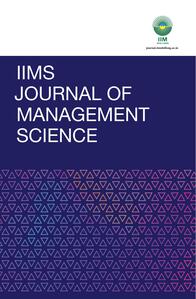
The IIMS Journal of Management Science continues to uphold its commitment to publishing research that connects academic insights with pressing real-world challenges. Each issue of the journal seeks to illuminate emerging paradigms in management and policy, while contributing meaningfully to both theoretical development and applied practice. This current issue presents a diverse yet interconnected collection of articles exploring contemporary shifts in consumer behavior, fiscal governance, entrepreneurial ecosystems, financial inclusion, sustainability, and global investment flows. Together, these contributions offer a rich mosaic of perspectives that invite deeper reflection on how organizations, markets, and communities are being redefined in an increasingly complex world.
“A Study on the Influence of Foodporn Imagery in Social Media Marketing and Consumer Behavior” by Sunita Boro and Saurabh Kumar Dixit, is an interdisciplinary investigation into the psychological, emotional, and behavioral effects of highly stylized food imagery shared on social media platforms. Drawing on the Technology Acceptance Model (TAM) and Uses and Gratifications Theory (UGT), the study finds that such “foodporn” content significantly enhances consumer engagement and emotional connection, leading to changes in dining frequency and food preferences. These findings are echoed in recent literature suggesting that digital sensory experiences—particularly visual aesthetics—can drive consumer choices even more powerfully than pricing or peer reviews (Petit, Velasco, & Spence, 2019; Schmitt, 2012). The study offers valuable guidance for marketers and hospitality businesses aiming to optimize digital strategies by investing in high-quality visual content and user-generated media.
The article, “Exploring Consumer Intentions Towards Cloud Kitchens in India: A Mediation Model Framework” by Verma et al., investigates the factors influencing consumer buying intentions towards cloud kitchens in India, with a focus on perceived innovativeness, food variety, price, food safety, and social influence. The authors propose a mediation model where trust acts as a critical link between consumer attitudes and their behavioural intentions. Using PLS-SEM on data collected via social media, the study finds that all five factors positively affect consumer attitudes, which in turn influence trust and ultimately purchase intentions. The emphasis on trust aligns with broader research in digital commerce, where trust is often a pivotal determinant in shaping consumer behavior and mitigating perceived risks (Gefen, Karahanna & Straub, 2003).
Banerjee and Ragoobur, in their article, “Indo–Mauritian Investment Trends Post-amendment of the Double Taxation Avoidance Agreement (DTAA),” examine the evolving investment relationship between India and Mauritius following the 2016 amendment to their Double Taxation Avoidance Agreement. Using a qualitative case study approach, the authors trace how Mauritius’s status as a tax haven influenced FDI flows, often through round-tripping mechanisms. The study finds that while legal reforms were aimed at curbing fiscal evasion, factors such as tax morale, FATF grey-listing, and rising Chinese influence also significantly impacted investment patterns. This echoes larger debates in global finance on treaty shopping, base erosion, and the ethical dimensions of tax governance (Cobham & Janský, 2018).
“A More Durable Relationship—The Case of Canadian Funding of Indian Infrastructure” by Pratap analyzes the strategic and long-term role of Canadian pension funds in financing Indian infrastructure. With over US$75 billion invested, funds like CPPIB, CDPQ, OTPP, and PSP are helping bridge India’s infrastructure gap through brownfield investments and InvITs. The study argues that these investments are mutually beneficial: India gains stable capital for growth, while Canadian funds secure long-term, low-risk, inflation-hedged returns. As global research has pointed out, pension funds are increasingly positioned as patient capital for emerging market infrastructure projects, balancing financial returns with systemic stability (Inderst, 2013).
The study titled, “A Grounded Theory of Peer Mechanism in a Self-help Group” by Nishi Malhotra explores how peer mechanisms function within Indian self-help groups (SHGs) to enhance financial inclusion and sustainability. Using 25 semi-structured interviews and the grounded theory method, the study identifies peer selection, monitoring, and enforcement as core mechanisms that enable members to access credit without collateral. The analysis reveals five emergent categories—social exchange, social control, social cohesion, sustainability, and social welfare—that together form a comprehensive model of how SHGs operate effectively. This research aligns with global findings that underscore the efficacy of social capital and peer accountability in achieving high repayment rates and promoting financial empowerment in resource-scarce contexts (Giné & Karlan, 2014).
Rohit Dwivedi reviews the book, “You Are Not Alone,” and offers a critical reflection on the book, a compilation of scholarly writings by Dr. Vinayshil Gautam. The review suggests that the book draws from decades of expertise in management, offering theoretically grounded yet practical insights into organizational behavior, economics, communication, operations, and leadership. Structured across 12 chapters, it serves as both a reflective retreat and an academic resource. While its formal tone may challenge casual readers, Dwivedi appreciates the book’s analytical depth and conceptual rigor, positioning it as a valuable contribution to Indian management thought and scholarship.
This issue of the IIMS Journal of Management Science brings together research that is both reflective and forward-looking, blending innovation with institutional insight. Whether focused on digital consumer trends, sustainable infrastructure, or collaborative finance, these contributions collectively offer pathways to rethinking management in an age of complexity and transformation. We invite scholars, industry leaders, and policymakers to engage with these findings and translate them into meaningful practice.
Cobham, A., & Janský, P. (2018). Global distribution of revenue loss from tax avoidance. UNU-WIDER Working Paper 2018/55.
Gefen, D., Karahanna, E., & Straub, D. W. (2003). Trust and TAM in online shopping: An integrated model. MIS Quarterly, 27(1), 51–90.
Giné, X., & Karlan, D. (2014). Group versus individual liability: Short and long term evidence from Philippine microcredit lending groups. Journal of Development Economics, 107, 65–83.
Inderst, G. (2013). Private infrastructure finance and investment in Europe. European Investment Bank Working Papers.
Petit, O., Velasco, C., & Spence, C. (2019). Digital sensory marketing: Integrating new technologies into multisensory online experience. Journal of Interactive Marketing, 45, 42–61.
Schmitt, B. (2012). The consumer psychology of brands. Journal of Consumer Psychology, 22(1), 7–17.
Neelam Rani
IIM Shillong, Meghalaya, India
E-mail: neelam@iimshillong.ac.in